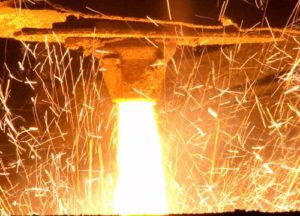 A foundry is an industrial facility that produces metal castings. Metals are cast into shapes by liquefying them into a fluid, pouring the metal into a mold, and removing or emptying the form material after the metal has solidified as it cools. The most widely recognized metals prepared are aluminum and solid metal. However, other metals, for example, bronze, metal, steel, magnesium, and zinc, are likewise used to create castings in foundries.
A foundry is an industrial facility that produces metal castings. Metals are cast into shapes by liquefying them into a fluid, pouring the metal into a mold, and removing or emptying the form material after the metal has solidified as it cools. The most widely recognized metals prepared are aluminum and solid metal. However, other metals, for example, bronze, metal, steel, magnesium, and zinc, are likewise used to create castings in foundries.
Foundry processes can be divided into two types – ferrous foundries and non-ferrous foundries i.e. the type of metal they use for casting of the moulds. Ferrous and Non-ferrous metals are distinguished by the presence of iron in the metal. Ferrous metals are defined as those metals that contain iron. Non-ferrous metals do not. Iron and its types like cast irons, grey iron, ductile iron, steel and other iron alloys are the examples of ferrous metals. Whereas Non-ferrous metals include every metal and alloy that does not contain iron, a short list of non-ferrous metals –
- Precious metals like silver, platinum, and gold
- Copper and its alloys like bronze and brass
- Nickle, Palladium, Platinum
- Aluminum
- Titanium
- Tin, Lead
- Zinc
Ferrous metals are the most well-known decision for castings, frequently picked for their cost-productivity and their mechanical properties. Now and again it’s not the quality of a metal that manages the decision, yet properties, for example, weight, corrosion resistance, or non-attraction. Non-ferrous alloys like bronze and brass can likewise be picked for tradition or for their delicacy.
Applications of Foundry –
- De-waxing of casting moulds
- Drying of casting moulds
- Hardening of foundry moulds
- Regeneration of casting mould waxes
- Removing of solid objects from moulds
- Core drying
The history of foundry traced back to the ancient period in which metallic objects in the form of coins, arrows, and household articles were in use. The casting process is said to have been practiced in early historic times by the craftsmen of Greek and Roman civilizations since then the role of metals has acquired unique significance. In modern times, mechanization leads to increased production, improved quality and reduction in production costs. Measures that aim at improving working conditions, delivering better quality products deserve enthusiastic support.
KERONE has always been the choice of various clients for its broad ‘hands-on’ involvement of use of microwave, radio frequency and infrared in all the foundry processes. Demystifying the numerous process of foundry casting and molding, we extend different machinery facilities and help to our regarded customers according to their particular procedure requisite. Diminishing natural effects is likewise a critical viewpoint for any preparing industry, and thus the entirety of our hardware and arrangement improvement is centered on limiting utilities consumption and better water and vitality stewardship, decreasing the product losses and wastages produced by the procedure.
Why choose us?
Since the last 42 years, accuracy, efficiency, machine quality and output quality are not just words but KERONE’s lifetime commitment towards our profession since its inception, creating a base of more than 1000 loyal customers. Our systems are used to meet the varying demands of numerous industrial applications – all with a level of precision that manufacturers seek. Fulfilling demands as per client’s specification has been our USP and we strive to carry the same forward. We also provide detailed assistance for installation without much hassle of complex functioning of the machinery. We always strive to achieve more than client satisfaction with our timely delivery, quality and efficiency towards all equipment manufactured by us.
